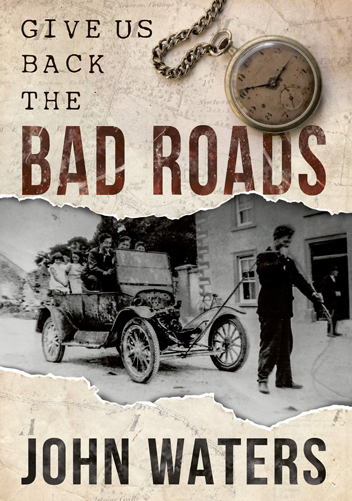
Give Us Back the Bad Roads, (Currach Books. 2018).
Publication date: 2019 On May 1st 1984, John Waters drove to Dublin to begin a career in Irish journalism that was to last for 31 years. During that time, he was to become a nationally
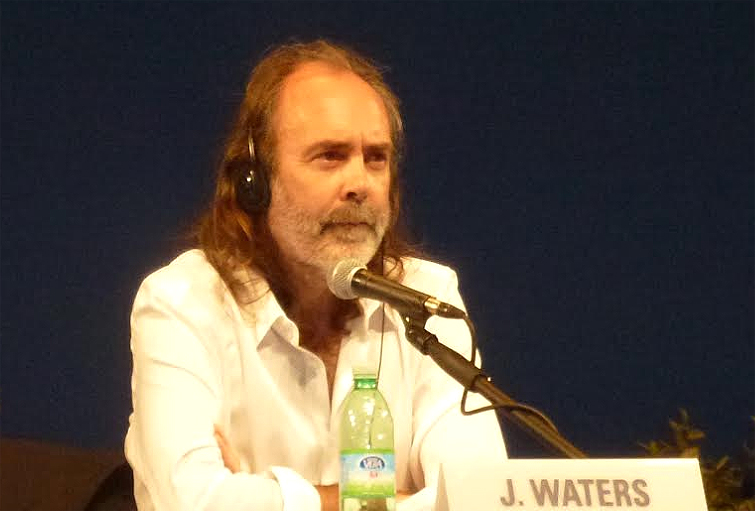
Born in Castlerea, Co, Roscommon, in the West of Ireland, in 1955, the only son of Ita and Thomas Waters, a mailcar driver, mechanic and carpenter.
Married to Rita Simons since 2014 and I have one daughter, Roisin born in 1996.
I have three sisters, two of whom survive. My father died in 1989, aged 84, my mother in 2012, aged 92.
Attended primary school at the Sisters of Mercy, Castlerea, to age 8; and the Marist Brothers, Castlerea, to age 12.
Secondary school: Mean Scoil Iosef Náofa (St Joseph’s Secondary School) Castlerea, to Leaving Cert in 1973. This co-ed school was founded and run by the legendary Mary O’Flanagan, a radical educationalist and niece of Father Michael O’Flanagan, an Irish republican who was a key figure in the War of Independence.
Early working life.
1974-1978: Clerical Officer with CIE, the Irish semi-state transoirt company: Clerk at Goods Store in Claremorris Railway Station, later at Westport, and finally at the School Bus Office at Ceannt Station, Galway.
1978/’79: Station Manager and Head of News at MidWest Radio, Castlerea, one of the earliest pirate radio stations in Ireland to operate outside the main urban centres. MidWest went on to obtain a broadcasting licence and become one of the most successful local stations in the country.
1979/80: Member of road crew with the Freshmen Showband, which toured Ireland North and South until late 1980, when the band broke up.
1980/’81: Gasoline pump attendant and house-painter/interior decorator. This was a period when I was trying to break into journalism. In Dublin.
1981-’84: Mailcar driver on postal routes out of Castlerea Post office following semi-retirement due to illness of my father, who had driven the mailcar for more than 50 years.
In this period also, I was West of Ireland correspondent for Hot Press, Ireland’s rock ‘n’ roll newspaper, contributing reviews and interviews as well as a regular radio review column. With Hot Press, I was centrally involved in shifting the paper from it previous preoccupation with rock and folk music to a wider engagement with politics and culture. I introduced and pioneered the Hot Press Interview, which became a celebrated trope of Irish journalism, provoking many controversies and ground-breaking discussions. I conducted the (in)famous 1984 Hot Press interview with the late Taoiseach (Prime Minister) and Fianna Fáil leader, Charles Haughey, in the course of which he spoke with some considerable emotion of his desire to push some of his enemies over a cliff.
1984: On being appointed a full-time staff writer with Hot Press, I moved to Dublin, where I have since lived.
1985: I became radio reviewer and feature writer with The Sunday Tribune and was more or less simultaneously appointed Editor of Magill TV Guide, a magazine established by Magill publisher Vincent Browne to mount a challenge in the European Court to the monopoly of TV listings magazines owned by the BBC, ITV and the sole Irish operator at the time, RTÉ. This initiative eventually proved successful, resulting in a free market for listings magazines.
1985-‘87: In late 1985, I was appointed Editor of In Dublin, the capital’s listings and cultural/political magazine. At this time, In Dublin was the leading cultural review for young people in the capital, but also carried in-depth coverage of politics and current affairs. For much of this period also, I continued as part-time adviser/Consultant Editor of Magill TV Guide. I also contributed in this period, as a television critic and book reviewer, to the Irish Independent and the Evening Herald.
1988: In January 1988, I became Editor of Magill, Ireland’s leading political and cultural monthly. This was a job I had aspired to for almost a decade, but the magazine was subsequently discontinued due to declining ad revenues as newspapers acquired the capacity to print advertising in full colour. I returned to a key editorial role in a revived Magill more than a decade later (2001) this time as Consultant Editor.
1989-‘90: For a year after leaving Magill I was a reporter on RTE Television’s arts programme, Arts Express. During this period also, I was a contributor to Ireland’s leading Sunday broadsheet, The Sunday Independent on politics and cultural affairs.
1990: In June 1990, I joined The Irish Times, then Ireland’s leading and most respected daily newspaper, as a feature writer. Six months later I was given a weekly column, which I continued writing until 2014. I also spent a period as Media Correspondent and Reporter.
1992/’93: For two years, I was a columnist with (London-based) The Observer’s Irish edition.
1998/99: During a three-year period when I lived mainly in London, I was a weekly contributor to The Irish Post, the newspaper of the Irish community in Britain.
2005/2006: I was in this period also a weekly columnist with The Voice Today, an experimental Catholic weekly. When this publication closed down due to financial difficulties in late 2006, I became a regular contributor to The Irish Catholic. For which I wrote until 2013.
In 2008, I became a columnist with The Irish Mail on Sunday, while continuing to contribute my weekly column to The Irish Times. This is a sister paper of the UK-based Mail/mailonline. In this period also I was a monthly columnist and feature writer with Traces, the international magazine of the Catholic movement Communion and Liberation, which is published in more than a dozen languages all over the world.
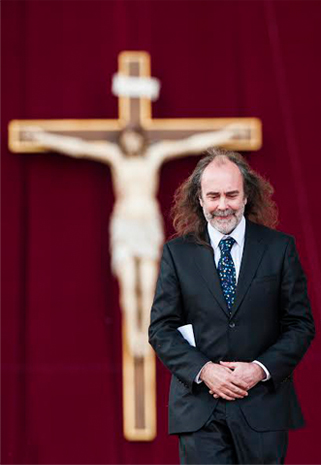
I was for many years what I fancied to be an instinctual left-winger, but had a Demascene ‘conversion’ in my 30s as a result of three factors: my encounter with the work of Vaclav Havel and the experience of visiting Eastern Europe after the fall of the Berlin wall; my battle with alcoholism, which culminated in an encounter with Alcoholics Anonymous in 1990, resulting in a return to religious practice and thinking; my discovery after becoming a single father in 1996 that such fathers had virtually no parenting rights and that none of those activists, journalists and artists with whom I had associated for many years of left-flirtation were the slightest bit interested in this phenomenon. Thus began a reevaluation of my entire political outlook. Though I avoid terms like ‘conservative’ and notions of left/right polarities, I am nowadays happy to declare that I find greater empathy with those who reject leftism in all its forms.
In my journalism and other writing since the early 1980s, I have sought to remain watchful for neglected areas of potential public interest, by striving to avoid simply repeating the pieties of mainstream journalism. I have also sought to make connections across a wide range of interest and experience, from pop culture to politics to religion, avoiding the obvious and the ideological in pursuit of the hidden common-sense thread.
I have long been troubled by the ideological herd instinct that infects modern journalism, and sought to confront this whenever I could. I believe journalism has a public duty to challenge orthodoxies, regardless of their source or nature, and to give particular representation to the views of those excluded from conventional discourse. I also believe that, in the absence of constant vigilance, the identities of such marginalized entities are prone to unnoticed shifting, with some groups often retaining a disproportionate and unnecessary degree of media support and affection long after they have ceased to be discriminated against, while other less fashionable categories remain voiceless because their concerns are neither cool nor ideologically approved. I believe that, in order to retain its cutting edge, a newspaper needs to be ever mindful of this syndrome, but my disillusionment with the Irish media as a result of the 2014/15 experience of the ‘gay marriage wars’ has led me to see that journalism has now become – almost everywhere – an instrument of propaganda and bullying.
In addition to writing for a wide range of Irish publications, I have over the years contributed to a number of leading European journals, including The Observer, The Guardian, The Tablet, La Stampa and L’Osservatore Romano, and The Spectator. Since 2017, I have been a contributors to the New York-based Catholic publication First Things. My work there can be found in one place at https://www.firstthings.com/featured-author/john-waters
In 2020, I launched my Substack page, Johne Waters Unchained, one of the earliest Irish writers to sign up to this innovative newsletter platform. My work on Unchained is available at johnwaters.substack.com
As a journalist, editor and columnist, I have specialised in raising unpopular issues of public importance, including the repression in modern Irish culture of memories of the Famines of the 1840s, the essential nature of the religious/absolute outlook in the personal and social dimensions; the unhealthy attitudes towards alcohol and drug-taking in Irish society, and the treatment of fathers and men generally in Irish life and culture. In 1996, I collaborated with the late Senator Tom Hayden in producing Irish Hunger, a collection of essays and reflections on the Famines by leading commentators and artists.
Arising from my writings on the subject of famine, I have taken a particular interest in the subject of poverty in third world countries, especially Malawi, Zambia and Uganda. In 2006, I researched, write and narrated a documentary on the Zambian economy, Faraway Up Close. I have also been involved with Irish development agencies Bóthar (Irish for ‘road’ – literally, ‘the width of a cow’ – they supply live farm animals to families in Africa and elsewhere) and Wells for Zoe, who assist the marginalized peoples of northern Malawi in building wells, gardens and fish tanks to enable their communities to become independent and self-sufficient.

Publication date: 2019 On May 1st 1984, John Waters drove to Dublin to begin a career in Irish journalism that was to last for 31 years. During that time, he was to become a nationally
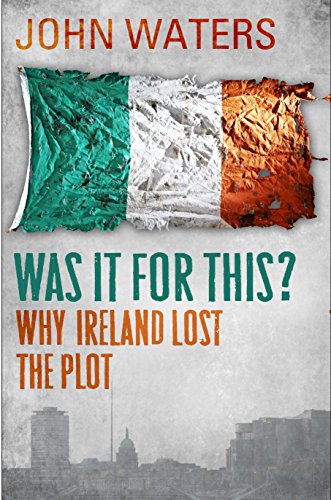
Publication date: 2012 (Transworld Ireland) John Waters’ remarkable new book sweeps through the pages of our recent history to get to the heart our political, social and existential identity crisis. Ranging across a vast canvas, Was
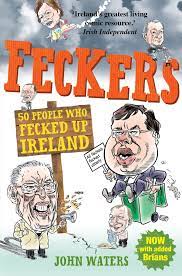
A satirical and yet intensely serious romp through the failures and feck-ups of Independent Ireland through the medium of personality.
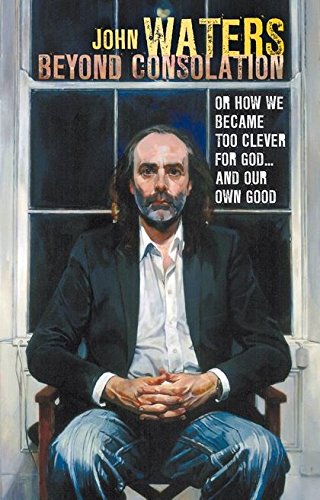
A reflection on Irish society’s relationship with the Absolute, arising from a remarkable radio interview given by my late colleague, Nuala O’Faolain, on her diagnosis with terminal cancer. Publication date: 2010 Waters explores the process
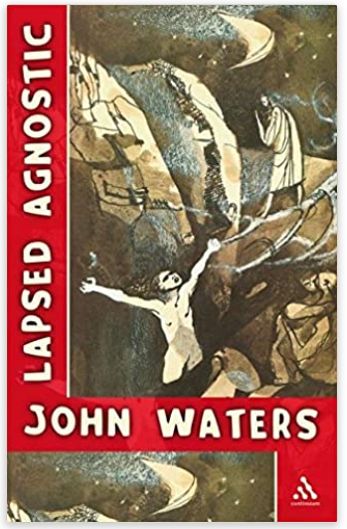
A reflection on my personal faith journey combined with an analysis of the condition of faith in Irish culture and society.
I was the originator and editor of another IHF fundraising project, a book designed to assist people in search of their lineage in compiling family trees and collecting information about their family histories.
Enter your email address to sign up for my free newsletter
Copyright © John Waters 2023